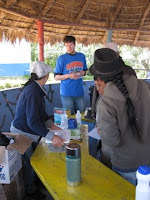
My journey back to Ecuador flew by much faster than I expected. As I landed in Quito late Friday night, I felt a wave of familiarity from the four months I had spent in the city during college. Waking up to the sound of honking horns and shouts, I was anxious to get out to the campo (countryside) near Otavalo, where I’ll be living until October.
So what am I doing here? I’ll be working for a small nonprofit called the Tandana Foundation (www.tandanafoundation.org) coordinating medical volunteers from the U.S., teaching in an elementary school, and finding ways for the foundation to support efforts local people are making to improve their lives.
Cotacachi volcano from my backyard.
Yesterday, tagging along with a group of the foundation’s donors, I got a chance to see some of the environmental and educational projects happening in the rural communities outside Otavalo. First we visited a tree nursery in Larcacunga, where a tiny, wise man named Matias cultivates 70,000 native trees a year to be distributed to the surrounding communities. Then we hiked up a few hundred feet to the water treatment plant that cost an American hotel owner and community benefactor $20,000 to build. Seems like a very reasonable price to pay for the health of people in the five communities that now have potable water.

Native tree nursery in Larcacunga.
Next we went to the house of Vicente Pazmiño to hear from some of the students that receive scholarships from the Tandana Foundation. It costs $300 a year to send a student through high school, which is no small expense for a family of ten living off of the land and trade of woven goods and food. Tandana supports 26 students who have expressed a desire to continue their studies beyond elementary school, which is by no means a given here. The students explained to us that coming from rural elementary schools puts them at a disadvantage and that the city kids tease them. They were very thankful for the opportunity to keep studying and eventually have a good job.
I have begun to settle in with my host family, which is not hard to do since they are some of the kindest people I have ever met. Papa Santos Quilumbango, who is a traditional healer, and Mama Maria Espinosa have a large, interesting family. There are 8 children: Condor (9), Nina (11), Tamia (15), Pacha (17), Elsa (21), Estela (23), Vinicio (24), Alberto (25), and Alberto’s wife Luzmila (20) and their 3 day-old baby. Vinicio and Estela go to university in Ibarra, the regional capital 30 minutes north of Otavalo. Alberto teaches adult literacy and plays folkloric music. The rest are in elementary or high school, and spend a lot of time in the afternoon meticulously doing their homework. The family clearly values education a lot, although they have to take out loans to make it happen.

On Sunday we went to a cousin’s wedding in Otavalo. Since it was a “mestizo” wedding instead of traditional indigenous wedding, the ceremony was held in a church. The party lasted all day and into the night, with tons of food, drinking and dancing. Several people circulated the room with Coca Cola, beer or liquor and invited every person to drink. When I say invited, what I mean is forced, because they wouldn’t leave until you drained the cup. My host parents were the last ones dancing, and at the end of the night Papito gave Mamita a huge hug. That sight alone made my day.
The family is very connected to their indigenous roots; they speak Kichwa at home--I need to learn so I’m not always laughing at jokes I don’t understand-- dress in the traditional way, and are either at school or working from dawn until midnight most days. They weave beautiful woolen fabric, cultivate corn, beans and cabbage, build furniture, play music, raise chickens, pigs and guinea pigs, and cook for 11 people every day.

There is definitely time for play too. One afternoon the kids and I went to play Frisbee in the neighborhood park, and had a ridiculously silly and amazing time. At home we played cards (the rules are always changing), and watched the small black and white TV while we ate our typical dinner of potato soup. Then I was off to bed, since I was planning to wake up at sunrise to go to see the pyramids at Cochasqui. That’s for another post…

Moment of Zen-- a flying guinea pig in the Las Palmeras hotel, home base for our medical volunteers.

















